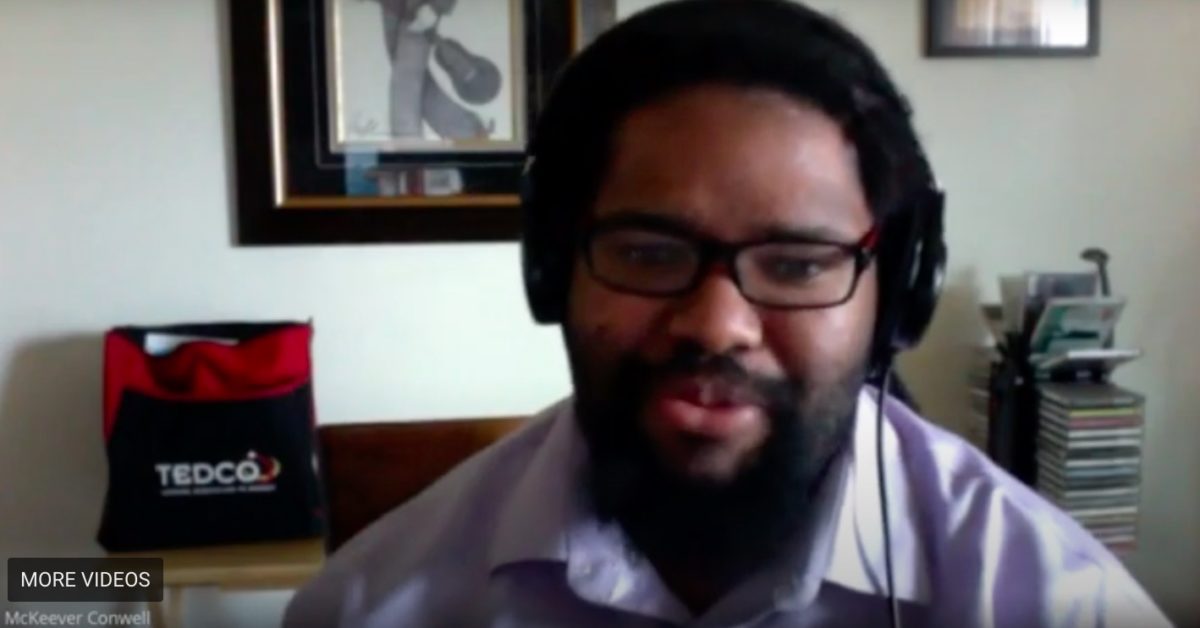Recessions have been likened to forest fires before: The underbrush gets cleared.
In a business sense, mergers and acquisitions and closures take place. Though a lot of bad can come from them, especially when they get out of control, there are very healthy outcomes too. Like the restaurant scrambling to establish takeout, the startup that speeds a financing or any company that updates what it sells or how it sells it, destruction authors ingenuity.
“We’re going to see who is built to be an entrepreneur,” said McKeever Conwell on the second episode of The TWIJ Show, a new weekly interview show on building better companies we at Technical.ly are piloting.
Conwell is a familiar face among Baltimore’s early startup scene. Once a government contractor, the software developer and two friends cofounded and grew a social gifting platform eventually called Given.to. He founded a second company, too, and has worked with several other Baltimore tech and early-stage companies. Since 2016, he’s been a portfolio manager on TEDCO’s pre-seed fund.
“Entrepreneurs that are flexible are finding ways to survive, thinking of unique ways to stay relevant,” Conwell said. “Entrepreneurs who are rigid are having a much harder time to navigate this.”
Conwell is quick to add how uniquely destructive today’s forest fire is. A pandemic is killing hundreds of thousands of people, and the ensuing economic shock has thrown tens of millions of people into unemployment. This will have lasting effects that are dangerous, damning and insidious.
But if entrepreneurs (not to mention the technologists and professionals they employ) self-identify as problem solvers, then we have plenty of problems to confront. This is a time for investors, employees and others to watch those entrepreneurs. Which ones will rise to the occasion and which ones will falter?
Any economic shock, and certainly one as disruptive as this one, are full of landmines. In the short term, income stops, as a cycle of customers hoard cash, sped by the most vulnerable going belly-up. Medium and longer term, behaviors shift. Experiments and discretionary budgets are slashed. One founder said to this reporter: “Even if you had product-market fit before COVID, you might have lost it. If you didn’t before, you certainly don’t have it now.”
All the skills of an organizational leader put to the test: team culture and morale support; business development ingenuity; cash-flow management; public perception and more. You see the intangible qualities that are easy to mask in better times.
The perspective among some investors might change, too.
“Investing in profitability over growth is never as exciting, because growth gets you the higher valuation,” said Conwell. But “those who were optimized for profitability are in better shape.”
Don’t misunderstand. For a time, there is still plenty of interest in pure growth. More than one investor has told this reporter that they’re advising their portfolio companies to close rounds now so they can spend the next 18 to 24 months focused on growth and ignoring the immediate distractions of a recession.There isn’t one playbook; the best entrepreneurs will navigate for the best outcome for their companies and their various stakeholders.
It can be a chance for investors to grab a discount, notes Conwell: “Valuations are going to come back to earth.”
Whether it be a reduction in force or hiring freeze or team morale stresses, any recession is difficult — one brought on by a pandemic is worse still. Amid the pain and strain, this is a time to build, by confronting new fast-moving challenges with limited information.
“Entrepreneurs are having hard, hard conversations,” Conwell said. “Some are going to be better at that than others.”
Join our growing Slack community
Join 5,000 tech professionals and entrepreneurs in our community Slack today!
Donate to the Journalism Fund
Your support powers our independent journalism. Unlike most business-media outlets, we don’t have a paywall. Instead, we count on your personal and organizational contributions.





